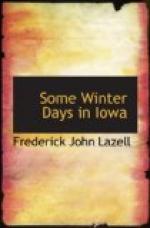"That nothing walks with
aimless feet;
That no one life
shall be destroyed,
Or cast as rubbish
to the void,
When God hath made the pile
complete?"
We are scarce a step ahead of our forefathers. We do not know.
"Behold, we know not anything;
I can but trust
that good shall fall
At last—far
off—at last to all,
And every winter change to
spring."
II. FEBRUARY IN STORM AND SHINE.
February often opens with a season of cold gray days when stratus clouds, dark and unrelenting as iron, hang across the sky and bitter winds from the northwest blow down the Iowa valleys and over the frost-cracked ridges. In the city the wheels crunch on the scanty snow, and every window is made opaque by the frost. Trains are many hours late, and dense clouds of steam from locomotive funnels condense into vivid whiteness in the wintry air. Nuthatches, woodpeckers, and chickadees join the English sparrows in begging crumbs and scraps around the kitchen door. In the timber the wind rustles shiveringly through the leaves which still cling to some of the oaks. The music of the woods is reduced to a minimum. Life is a serious business for everyone who has to work in order that he may eat; there is little time or spirit for song. In the late forenoon and again in the middle of the afternoon the rattle of bills may be heard on the branches; at other times the woods are almost silent, save for the cracking of the earth as it heaves under the frost, and the boom of the ever thickening ice on the river.
* * * * *
Then the south wind steals across King Winter’s borderland, and the iron clouds begin to relax. But at first there seems little improvement. “The south end of a north wind,” say the experienced, and shiver. But wait. Every hour the wind grows warmer and the clouds softer. They come closer to the earth, hanging like a thick curtain across the sky. On the prairie the diameter of the circling horizon seems scarcely three miles long. The clouds hug the far sides of the nearest ridges and shut you in, above and around. It must have been such a day as this when Fitzgerald made that line of the Rubaiyat read: “And this inverted bowl they call the sky.” Today the bowl seems very small and dreary.




